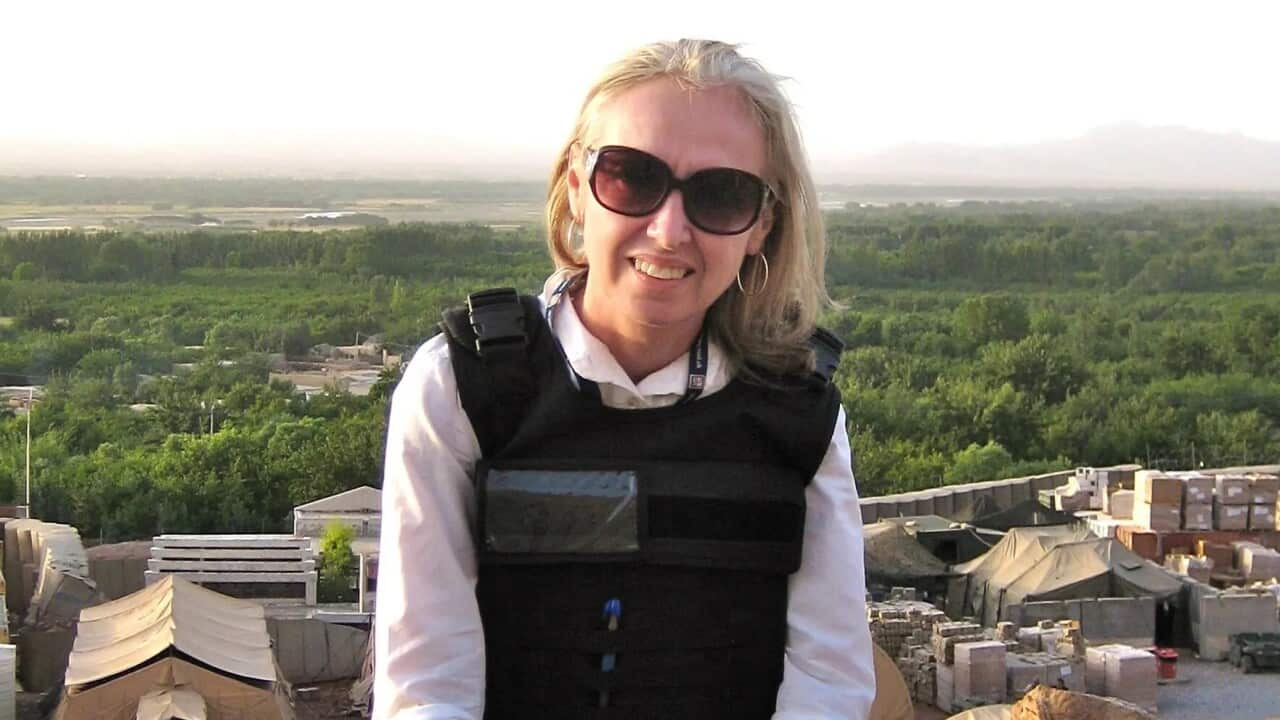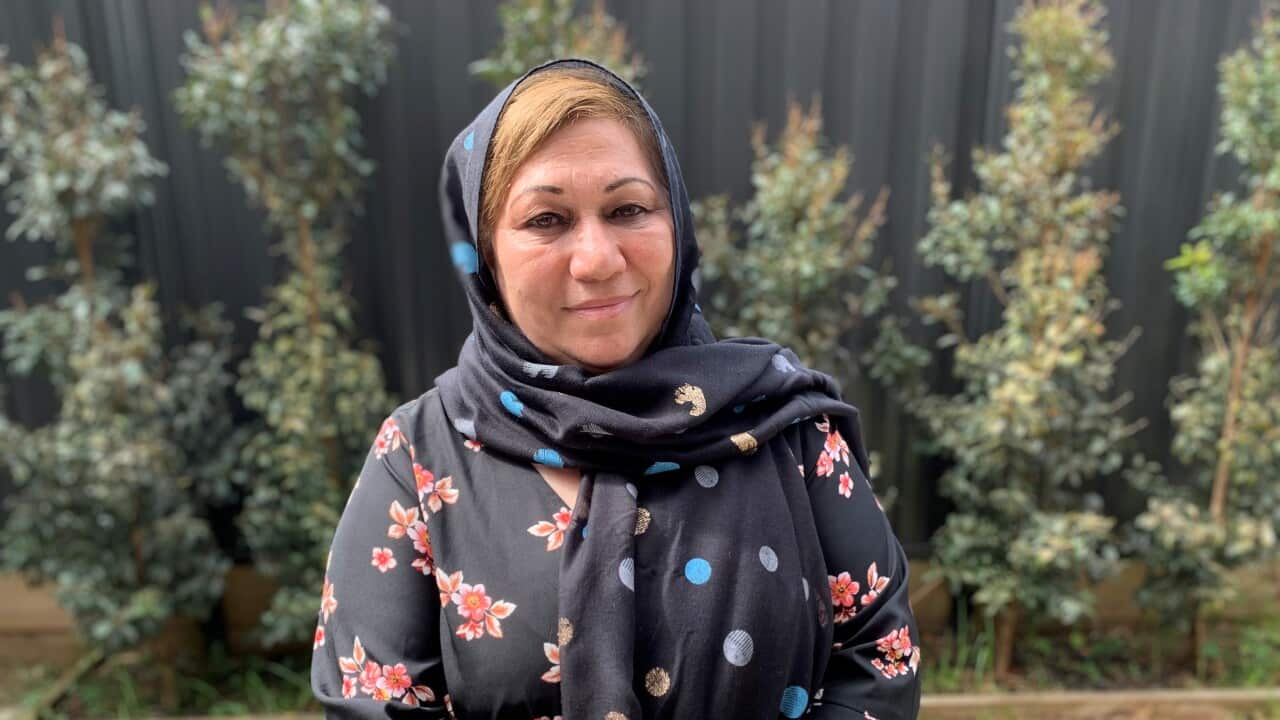Key Points
- An Australian journalist alleges she was abused, detained and threatened by the Taliban
- She says the way she was treated by the regime showed her the Taliban's "true face".
A veteran Australian foreign correspondent has said that by allegedly detaining her, threatening her with prison, and forcing her to publicly retract some of her stories, the Taliban has shown its "true face".
Lynne O'Donnell - who writes for Foreign Policy and other publications - this week travelled to Kabul to see what had become of Afghanistan since she'd left on 15 August last year, just hours before .
"I thought that it was my professional duty to go back and familiarise myself with the situation, especially as we're coming up to the first anniversary of the fall of the Republic," she told SBS News.
Ms O'Donnell arrived in Kabul on Sunday and went straight to the foreign ministry "in good faith" to notify the Taliban she was in the country as a visiting reporter - a requirement of the regime.
There, she said foreign ministry spokesman Abdul Qahar Balkhi told her she was "not a recognised journalist" and that despite her having a valid visa, the security and intelligence agency would be in touch with her to ask her to leave the country.
"He called me a white supremacist colonialist," she said.
"He threatened me with violence by reminding me of a very nasty, and deadly suicide attack on employees of a domestic television station that had issued an erroneous report and refuse to retract it years ago.
"He was just not very diplomatic in his approach."
Ms O'Donnell said she was later contacted by intelligence officials who told her she had to attend a face-to-face meeting with them "to discuss [her] crimes".
After trying to put them off for three days, she was detained and taken to their offices, where she was verbally abused and accused of fabricating all of her articles.
Ms O'Donnell said they especially took issue with two stories of hers - and another about .
"They said that I had made them up, they said that I had no verification," she said.
"I said I did. Everything, especially the one about the sex slavery, the forced marriages, everything was on the record."
Ms O'Donnell said the Taliban demanded she reveal her sources for the stories, but she refused.
"They told me that they would send me to jail unless I tweeted a confession that all of my stories were made up, and that they were all based on nothing, that there was no basis in fact, and they couldn't be verified."
Ms O'Donnell said what followed was "a very strange, amusing, Kafkaesque situation" where the intelligence officials dictated the tweet, looked at the published version online, said they didn’t like it, and asked her to delete it and post another version.
"I said, 'you're going to look silly if you do this'. They didn't believe me, and looked silly," she said.
Ms O'Donnell said they then videoed her making a confession saying "I call myself a journalist, but I don't know anything about Afghanistan's culture or history. And I make up everything."
"The first take, I used my headscarf as a noose and I held it up and said 'I haven't been coerced, I've been told to say I haven't been coerced.' And we had a laugh about that and did it again, and then they took me back to my guest house," she said.
"I'm out of the country, so I can laugh about it and make jokes about it. But it's not funny, it's really very serious."
Fears for those left behind
Ms O'Donnell said while she was allowed to use her phone during the hours-long ordeal, meaning Australian diplomats in Doha were able to contact her and track her location, she "would be lying" if she said she "had no fear".
"This is an unaccountable regime. They operate arbitrarily, unilaterally. There is no law, there's no security; people are constantly being disappeared, detained for no reason, beaten, killed, merely for association with the former government," she said.
"So I knew that I was vulnerable, but I also know that they are desperate to have some level of diplomatic recognition that gives them legitimacy, and harming me would certainly scupper that, at least in the short term.”
After flying out of Afghanistan on Wednesday, Ms O'Donnell's concerns are now for those left behind.
She's been unable to get in contact with her driver since Tuesday, and some friends whom she'd visited during her trip were later "contacted, detained and interrogated by the Taliban".
Ms O'Donnell said she'd be "foolish and reckless" to return.
"Part of my job is to do no harm, and I don't want to burden anybody else with the consequences in my presence," she said.
Press 'freedom' in Afghanistan
A found that since the Taliban regained control of Afghanistan in August last year, 173 journalists and media workers had been detained had been subjected to human rights violations, including arrests, torture, and threats. Five journalists were murdered by IS militants during the same period, while another was killed in unknown circumstances.
Ms O'Donnell said the Taliban had made sure freedom of the press no longer exists in Afghanistan.
"They took over media organisations, closed them down, detained, beat, killed journalists," she said.
Many of the local journalists who were unable to flee the country remain hiding, Ms O'Donnell said.
"There are media monitoring organisations that have stopped publishing their reports, but people told me that this intimidation still goes on," she said.
"More than one person described it to me as a reign of terror, and I believe that when you are ruling by fear with impunity that that is a fair description."
Ms O'Donnell said she believed what happened to her was an attempt to extend the control over local media to foreign journalists.
"I think that what they have done by treating me the way they did is hand me a global platform to talk about the situation," she said.
In a statement to SBS News, the Department of Foreign Affairs and Trade confirmed it provided Ms O’Donnell with consular assistance while she was in Afghanistan, but declined to comment further due to its "privacy obligations".
SBS News has contacted a Taliban spokesperson for comment.












